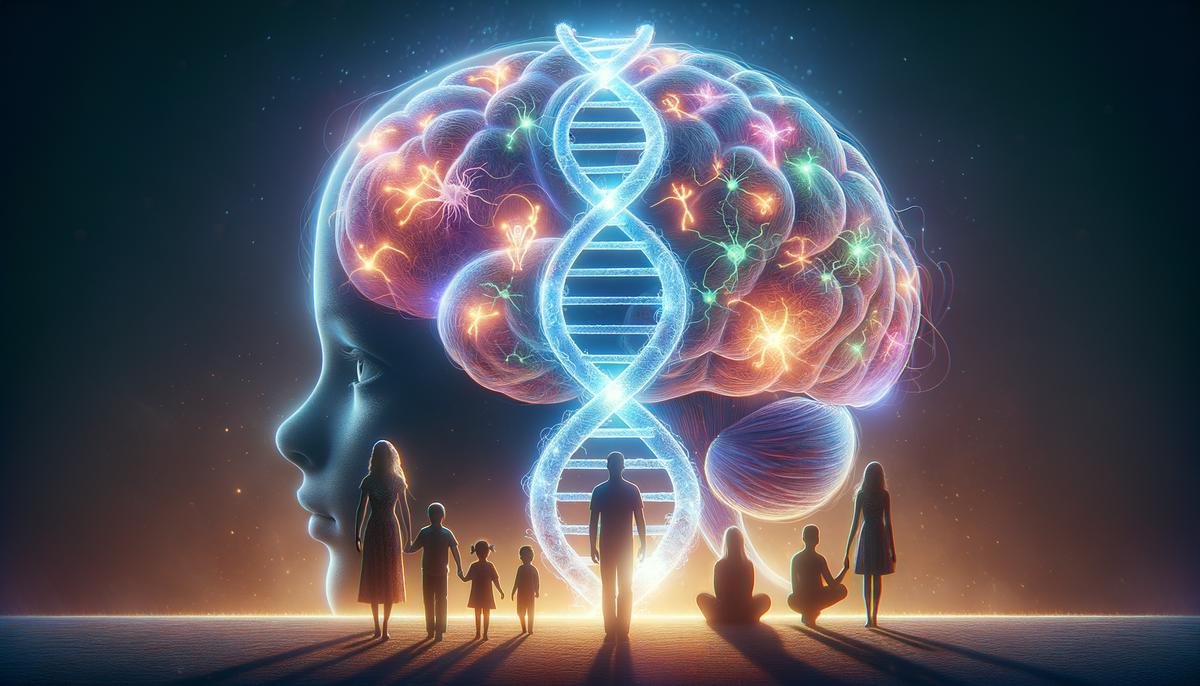
Understanding the intricate challenges of autism sleep disorders and the potential role of melatonin may seem like a tall order for most, but this insight is invaluable for many families. The aim of this article is to break down the complexities, offering clear, easy to understand information, not just to enlighten, but to generate practical solutions for uninterrupted sleep – a necessity that is often elusive for individuals with autism. From unfolding what melatonin is and its role in sleep to illuminating its connection with autism sleep disorders, this discourse is informed case-by-case, akin to the journey of a caring parent committed to the well-being of their loved ones.
Understanding Autism Sleep Disorders
Many welcoming nods and warm smiles to all the wonderful parents out there navigating the journey of autism. Today we’re exploring a topic that all parents can relate to – sleep. Or more accurately, the often exasperating lack of it. Sleep disorders are widespread among children with autism, making this an important topic for us to delve into.
Autism Spectrum Disorder (ASD), a developmental disorder affecting communication and behavior, is often associated with a range of sleep disturbances, making bedtime anything but restful for both child and parents. The research suggests that up to 80% of children with ASD experience one or more chronic sleep problems.
First on our list is Insomnia.
It’s common for children with ASD to have difficulty falling asleep, staying asleep, or waking up earlier than desired. This could be due to medical problems like gastrointestinal issues or epilepsy, psychiatric conditions such as anxiety, and sensory sensitivities. It could also be linked to certain behaviors and routines that may interfere with sleep.
Next up is Sleep Disordered Breathing (SDB),
which includes conditions resulting from breathing problems during sleep. The most common form of SDB is Obstructive Sleep Apnea (OSA), where the airway becomes partially or completely blocked during sleep, often causing snoring and noticeable breaks in breathing.
We also have the Parasomnias.
This covers all those unusual things that can happen while a child is falling asleep, during sleep, or waking up – think sleepwalking, night terrors, or nightmares. These disturbing occurrences can leave both child and parents feeling rattled and weary.
Lastly, Circadian Rhythm Sleep Disorders (CRSD) deserve a mention.
Our body’s internal clock, or circadian rhythm, regulates our sleep-wake cycle. For some children with ASD, this rhythm may be disrupted, meaning they may feel alert and awake at night, but extremely sleepy during the day.Navigating sleep disorders associated with autism can be a daunting journey. Remember, it’s okay to ask for help and it’s okay to seek professional guidance. A variety of treatments exist, from behavioral interventions and medication to specialized sleep training. Deciding the best approach often depends on understanding the precise nature of the sleep problem, and how it’s impacting everyday activities and quality of life.
Intricacies and sleepless nights aside, parenting a child with autism comes with countless blessings and moments of joy. As we delve deep into the challenges, remember the tremendous strides being made every day in understanding and managing autism-related sleep disorders. Consider every challenge a stepping stone to achieving better restful nights for everyone.
And remember, there’s a world of loving and supportive parents out there – just like you – who are always willing to share their own journeys and lend a helping hand. Our online community exists as a beacon of hope, empathy, and understanding. After all, we’re in this wonderful journey of parenting together. Sleep tight!

Melatonin and its Role in Sleep
Deciphering Melatonin and Its Power in Ensuring a Good Night’s Sleep
In this bustling day and age, achieving adequate sleep is akin to striking gold, especially when it comes to children in the throes of their growth journey. More so, when we talk about angels on the autism spectrum, understanding the role of melatonin – a hormone often prescribed to aid sleep – becomes essential. So, let’s delve into unmasking this hormone and its relation to a restful slumber.
Firstly, what is Melatonin? Irrespective of a human’s age or condition, every body produces this hormone naturally. Often known as the “sleep hormone,” melatonin is manufactured by the pineal gland in our brain. Its production and release into the bloodstream are largely affected by light exposure. As evening draws nearer and the environment darkens, the melatonin levels rise, thus preparing the body for sleep.
Understandably, sleep is more than a comfort – it’s a necessity. As parents, servants of our beloved munchkins, we discern how a disruption in sleep patterns can affect our youngsters’ daily life. Here’s where melatonin plays a pivotal role. It signals the body to ease into relaxation by reducing alertness, encouraging the cycle of sleep to take precedence.
In relation to children with Autism Spectrum Disorder (ASD), the significance of melatonin takes a new height. Studies indicate that some with ASD may have lower amounts of melatonin compared to neurotypical children, contributing to sleep disturbances experienced.
Anecdotal evidence and some scientific studies have shown potential in using melatonin supplements to address these issues, especially in ASD children facing insomnias. However, a key takeaway is always to involve a trusted doctor or health professional before setting out on this route.
Despite the challenges, every step we take to ensure a good night’s sleep for our child springs another step towards their overall wellbeing. It opens the gateways to not only their cognitive and physical development but also ensures a smile that lights up even the darkest hours.
Bonding over bedtime stories, overshadowing nightmares with comforting kisses, and ensuring a good sleep, utilizing whatever gems the medical fraternity has to offer! Isn’t that the quintessence of parenthood we all cherish?
As we sign off, remember that while melatonin is a beneficial tool in our arsenal to combat sleep woes, the best magic resides in comfy PJs, a cosy blanket, a heartwarming bedtime routine, and a whole lot of parental love!
Feel free to reach out, share, or delve more into this space — a haven where family, parenting, science, love, and care converge. Together, let’s continue learning how to navigate this beautiful journey called parenthood. After all, we aren’t just families; we are teams, communities – we are a village.

The Connection between Melatonin and Autism Sleep Disorders
Unveiling the Secrets of Melatonin: A Key Benefit for Autism Sleep Disorders
What a wonderful world our children experience – exploring, learning, playing, and most importantly, growing. A significant part of this growth happens when they’re fast asleep, dreaming about their newfound knowledge and adventures. Sleep is an essential component of their daily life, fueling their health and development. We’ve already talked about the unique sleeping patterns seen in children with Autism Spectrum Disorder (ASD) and how these can impact their life and those around them. Now, it’s time to dive into the world of melatonin, an important hormone aiding their sweet slumber.
Melatonin, often referred to as the ‘sleep hormone’, is naturally produced in our bodies and triggers the feeling of sleepiness when night draws near. It plays a pivot role in maintaining our circadian rhythms or sleep-wake cycle, helping to guide us to sleep when darkness falls and awaken as the sun rises.
It’s not uncommon to find disrupted sleep-wake cycles in children diagnosed with ASD. As much of a challenge as it can be, there’s always hope, and you’re certainly not alone. Melatonin might just be a beneficial companion on this journey.
Numerous scientific studies suggest that children with ASD have lower melatonin levels compared to their peers. Interestingly, researchers have found a close link between melatonin levels and the severity of sleep disorders. Suggesting that melatonin could indeed play a key role in the complex sleep patterns seen in children with ASD.
Given these insights, it’s plausible to consider melatonin supplements as a potential solution for sleep disruptions in children with ASD. But remember, medical decisions are best made when thoughtfully discussed with a health professional first.
If your child’s doctor suggests giving melatonin supplements a try, they can guide you through appropriate dosage amounts and timing. Just like any supplement, it’s important that it be administered correctly; after all, our goal is to support and foster our child’s wellbeing.
Of course, melatonin isn’t a magical cure-all. It’s just one element of a comprehensive approach to ensuring a good night’s sleep for your child. Bedtime routines have an equally important role to play. Consistent routines, comfortable sleeping environments, and limiting exposure to electronic screens before bedtime can work in tandem with melatonin to bring about restful nights.
Parental love and the daily dedication you show also plays an unparalleled role in the overall wellbeing and happiness of your child – from capturing magic moments at playtime, to the gentle lullabies that coax your little one to sleep.
Developing a supportive and caring network of loved ones, fellow parents, and professionals can also make a significant difference. Parenting is a journey we embark on together, filled with shared experiences, valuable advice, and unconditional love.
Above all, our goal is to guide our children towards health and happiness while embracing the delightful quirks and uniqueness that make them who they are. Whether it involves melatonin supplements or creating magical bedtime stories, we’re on this journey together, fearlessly paving the path for our children to follow.

The Safety and Dosage of Melatonin for Autism Sleep Disorders
Now that we’ve established the integral part sleep and the hormone melatonin play in the lives of children with Autism Spectrum Disorder (ASD), let’s delve into the question on everyone’s mind: is it safe to use melatonin for autism sleep disorders and, if so, what is the correct dosage?
Melatonin is a natural hormone our bodies produce to regulate sleep. It’s often referred to as the “sleep hormone” as it enables our bodies to follow a healthy sleep-wake cycle. For some children with ASD, their body either doesn’t produce enough melatonin or doesn’t release it at the right times, resulting in sleep disruptions.
Research suggests that melatonin supplements could potentially help address these sleep disturbances in children with ASD. Several studies have shown improved sleep duration, diminished night waking, and shortened time taken to fall asleep in these children when taking these supplements.
So, is melatonin safe for children with autism sleep disorders? Current research points towards “yes.” Still, it’s important to remember that everyone is different with varying needs, and each child may respond differently to melatonin. So, what helps one child might not be the answer for another.
Then, what’s the appropriate dosage? The correct dosage of melatonin depends on many factors such as age, size, and severity of sleep issues. Dosages generally range from 1 to 10 milligrams. Always consult with a doctor or health professional before starting a melatonin regimen to determine the right starting dosage for your child, and whether it’s safe to combine melatonin with other medications your child may be taking.
Remember, supplements like melatonin should be part of a comprehensive sleep strategy. For every child, it’s vital to develop a regular sleep schedule, create a calm and comfortable sleeping environment, and limit exposure to electronic devices before bedtime.
Parenting a child with ASD comes with its unique challenges, but remember, you’re not alone. Reach out to health professionals, engage with online communities, and draw upon the strength of your supportive network. Together, you’ll discover that embracing the unique qualities and quirks of your child can lead to unexpected moments of joy and richness in life.
When it comes to improving sleep problems in children with ASD, remember that there’s no one-size-fits-all solution. You’ll find what best works for your family through trial, patience, and love. And who knows? You might just find that the secret to a good night’s sleep comes in many forms, and sometimes, that form is a melatonin supplement.

Personal Stories and Experiences
After considering the struggles and challenges our precious little ones with Autism Spectrum Disorder (ASD) face, it’s crucial to discuss a increasingly popular and potentially beneficial solution: melatonin. The role of melatonin in the regulation of sleep for ASD children has proven to be a promising development in the field of ASD treatment and parental management.
Children with ASD often experience significant sleep disturbances, which can further exacerbate their symptoms and challenge their daily functioning. Lack of quality sleep can make it more difficult for our kiddos to control their behavior, communicate effectively, and cope with the sensory overload that is all too familiar to them.
Many parents and caregivers are hearing whispers of the potential benefits of melatonin supplements, a natural hormone that our bodies produce to regulate the circadian rhythm. Numerous scientific studies and anecdotal evidence have pointed to melatonin as a potential solution to these sleep disturbances, improving both the duration and quality of sleep in individuals with ASD.
Safety is our number one priority when it comes to our children. As parents, we know that it’s not enough for a treatment to be effectively; it must also be safe. The administration of melatonin to ASD children has been deemed safe and well-tolerated in several clinical studies, offering parents a sigh of relief.
However, it’s essential to bear in mind that every child is unique. There are noticeable individual differences in response to melatonin supplementation. Some children may respond positively with immediate effect while others may take a few weeks before improvements become apparent.
Determining the appropriate dosage of melatonin for ASD children can be a bit of a balancing act. Trials have demonstrated that smaller doses can be as effective as larger ones in managing sleep-related challenges. Therefore, it’s advisable to start small and increase the dosage gradually under the supervision of a healthcare professional.
While melatonin holds great promise, it shouldn’t overshadow the importance of a comprehensive sleep strategy and lifestyle changes. Bedtime routines, healthy eating habits, and physical activity during the day can enhance the effect of melatonin and promote better sleep.
Before diving headfirst into the world of melatonin, we all know the drill. Speak with a knowledgeable healthcare professional who can provide guidance based on your child’s specific needs and conditions. They can answer any questions, alleviate any concerns, and ensure that you’re making the best possible decision for your child’s health and well-being.
Parenting a child with ASD is a path filled with challenges, but also countless rewards. Navigating sleep problems is just one aspect of the journey. It’s a journey enriched by love, learning, and deep connections.
To address sleep problems in children with ASD effectively, it’s vital to approach the issue through the lens of personalized care and understanding. Just as every child is different, so are their sleep needs and responses to sleep treatments. We owe it to them, to seek out the wonderful, unique individuals that they are and to provide love and care in equal measure.

In navigating the waters of autism sleep disorders and the potential benefits of melatonin, it’s heartwarming to know that we’re not alone. Many families have walked this path before us, and their experiences provide valuable insights. These shared accounts reiterate the role of melatonin in alleviating sleep disorders tied to autism. They offer hope, and most importantly, they underscore the importance of community and shared knowledge in tackling the challenges we may face. Throughout this journey, remember to keep love, patience, and an open mind – powerful tools that, coupled with informed choices, can help build a brighter future, one good night’s sleep at a time.




